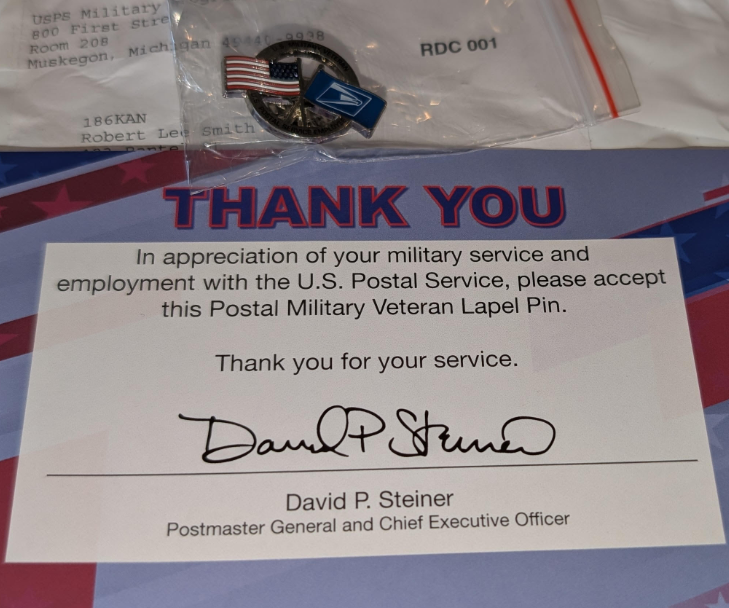A Tale of Two Letters
Somewhere in the shuffle of bureaucracy and ceremony, two envelopes crossed paths.
One carried a lapel pin and a pre-printed thank you for your service from the Postmaster General.
The other was my letter to Congressman John Joyce, asking why that same agency refuses to follow its own written rulebook on how to treat returning veterans.
That contrast says more about the state of veterans’ policy in America than any speech ever could.
The Empty Gesture
Every Veterans Day, the country lines up to say the same words:
Thank you for your service.
It appears on checkout screens, in discount codes, and in corporate press releases.
But behind those polite phrases, many veterans still face the same slow erosion — of benefits, pay, and dignity — by the very systems they served to protect.
We don’t need more slogans.
We need agencies that read their own manuals and honor the laws already on the books.
When Procedure Replaces Justice
My story isn’t unique. It’s just documented.
After serving in the Navy during Desert Shield and Desert Storm, I built nearly two decades with the United States Postal Service.
When I was rehired after a break in service, the agency ignored both my prior time and my veterans’ preference — a clear violation of ELM § 422.121(d), which states:
Veterans’ Preference Eligible:
An employee whose service seniority is established pursuant to the appropriate entrance register standing (i.e., a veterans’ preference eligible) is placed in the step attained by the lower eligible, with the same anniversary date for step increases as the lower eligible.
(See also Handbook EL–312, Employment and Placement.)
That section exists for one reason: to keep agencies from treating experienced veterans like new hires.
Yet when USPS set my pay as if I had never worked there, no one stepped in to enforce it — not management, not HR, not even the grievance system designed to correct such errors.
To date USPS just ignores the discussion and says, “no”.
Bureaucracy as Battlefield
The modern veteran’s challenges rarely come from combat anymore.
They come from paperwork, procedures, and policy gaps that no one feels responsible for fixing.
It’s not a battlefield of smoke and sound, but of emails, forms, and hold music — where every delay or missing response can quietly erase months of progress.
Inside the system, most people mean well. They listen, they nod, they say they understand. But the structure they work within rewards compliance, not resolution.
Each handoff, review, or deferral becomes another layer of delay — another reason to wait.
For veterans navigating that maze, the struggle isn’t about winning an argument.
It’s about surviving the process long enough for the truth to matter.
The Real Meaning of Gratitude
I’m not asking for a favor. I’m asking for compliance — with the agency’s own manual, its own law, its own promise.
That’s not rebellion. That’s accountability.
If the United States Postal Service — one of the nation’s largest federal employers of veterans — cannot follow its own veterans’ pay-setting rule, what does that say about smaller agencies with less oversight?
Don’t thank me for my service.
Honor that service by enforcing the protections it earned.
From Symbol to Substance
We’ve built an elaborate culture of gratitude — flags, pins, ceremonies, hashtags — while allowing the systems meant to serve veterans to decay under paperwork and politics.
The statutes guaranteeing fair pay and reemployment aren’t hidden; they’re codified in 5 U.S.C., 5 C.F.R., and the USPS Employee and Labor Relations Manual itself.
The problem isn’t the law — it’s the follow-through.
The truth is simple: veterans don’t need another round of applause.
We need working grievance procedures, functioning oversight, and an appeals process that values outcomes over timelines.
What Service Should Still Mean
Service was meant to be a shared responsibility — a covenant between those who serve and the institutions they protect.
It’s supposed to mean sacrifice for a greater good.
Instead, it too often means sacrifice for convenience.
I’m not alone in this fight, and I don’t write in bitterness.
I write because this story isn’t just mine — it’s a mirror held up to every agency that has forgotten the difference between honoring veterans and handling them.
If you truly want to thank a veteran, start by enforcing your own policies.
Pay what’s earned.
Fix what’s broken.
That will be thanks enough.
